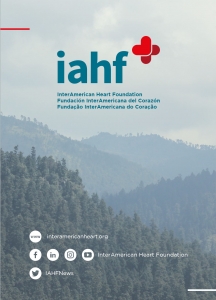Who we are
The InterAmerican Heart Program was created in September 1992 under the auspice of the World Heart Federation with the support of the American Heart Association, the Heart & Stroke Foundation of Canada, the Interamerican Society of Cardiology, and other heart foundations / societies throughout the American continents.
On April 17, 1994, in Mexico City, 21 participants representing 12 countries in the Americas signed a Statement of Intent to become members of the organization they named “InterAmerican Heart Foundation (IAHF)”, whose mission was to reduce heart diseases and stroke, and related non-communicable diseases, in Latin America and the Caribbean and promote health through research, advocacy, public awareness and education.
In July of 1995, the InterAmerican Heart Foundation was legally formed as a US 501(c)(3) tax-exempt non-profit organization promoting health and well-being in Latin America and the Caribbean (LAC) by working to reduce heart disease and stroke, cancer, diabetes, and chronic respiratory diseases –the non-communicable diseases or NCDs– which are the leading cause of premature death and disability in the world today.

What we do
 IAHF efforts are directed at modifying the risk factors that cause NCDs, promoting smoke-free environments, healthy diets, and physical activity in schools and communities. We facilitate the development of networks of civil society organizations that work together to reduce the risks of obesity, hypertension, smoking, physical inactivity, the harmful use of alcohol, the effects of air pollution, and defending the right to health and information. See our new IAHF Brochure for more information.
IAHF efforts are directed at modifying the risk factors that cause NCDs, promoting smoke-free environments, healthy diets, and physical activity in schools and communities. We facilitate the development of networks of civil society organizations that work together to reduce the risks of obesity, hypertension, smoking, physical inactivity, the harmful use of alcohol, the effects of air pollution, and defending the right to health and information. See our new IAHF Brochure for more information.
More people are using tobacco, diets have more fat, and physical work is being replaced by labor-saving devices. This has contributed to sedentary lifestyles and weight gain. The combination of bad lifestyle habits and urbanization, over time, leads to high cholesterol, diabetes, high blood pressure, and the premature development of atherosclerosis.
The result can be heart attack, heart failure, stroke, peripheral vascular disease, and other vascular problems. Medical treatment requires huge expenditures for medical and hospital care, depleting economic resources at all levels of the countries of the Americas.
What are the challenges?
– Promote healthy living and reduce NCDs in Latin America and the Caribbean through research, advocacy, public awareness and education.
– Increase awareness in countries of the urgency of dealing with this pandemic which consumes a large part of health budgets and undermines sustainable development, becoming an issue of social equity.
– Make NCDs a priority investment for health and development, promoting funding models that support cost-effective national responses to NCDs.
– Strengthen and mobilize civil society, incorporating the voices of young people and persons living with NCDs, enabling the development of networks of civil society organizations, integrating the academic and scientific world, so that they commit governments and multilateral organizations in this effort.
Rising to the challenge
– Create awareness, inform and educate political decision-makers, the media and the public about people’s right to health and to useful, clear and understandable information about what they consume including food and beverages, tobacco and alcohol products.
– Strengthen public policies to generate the changes and regulations necessary to improve the quality of life for everyone.
– Promote smoke-free environments and warning labels for unhealthy products such as tobacco, e-cigarettes, excess salt, ultra-processed foods and sugary drinks.
– Improve access and affordability of fruits and vegetables, promote physical activity and control air pollution.
– Raise awareness on government responsibility to protect people´s health with effective policies that create an environment that favors individuals´ healthy choices.
